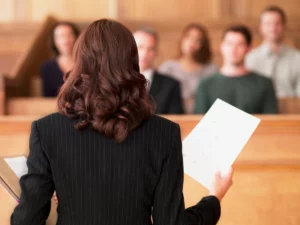What Happens When You’re Charged with a Crime in Maryland? Are Juveniles Treated Like Adults?
The answer may depend on your age, and the particulars of your crime. In Maryland, there are four paths following criminal charges: (1) If you are 18 years or older you will be charged as an adult, and move through the adult penal system, (2) If you are between 14 and 18 years old and are being charged with a crime that could result in life in prison if you were an adult, you may be charged as an adult and move through the adult penal system, (3) If you are under 18 years old, you may be charged as a juvenile, and proceed through the juvenile justice system, or (4) If you are 11-17 years old you may be charged as a juvenile and work your way through the Teen Court system. Your path depends on a number of factors including your criminal history and severity of the current charges.
An adult’s journey through the criminal justice system may begin with an arrest followed by up to 24 hours in jail, at which point they must either be released or provided a bail hearing. A judge will hear the basics of the case, and either set bail to give the defendant an opportunity to leave jail pending additional hearings, or deny bail which will force him or her to stay incarcerated until the next hearing date. Next, there will be an arraignment to hear the formal charges and enter a plea–guilty, not guilty, or nolo contendere (not admitting guilt, but subjecting oneself to punishment). Following the arraignment, there may be a preliminary hearing to make the charges clear, ensure access to an attorney, and learn whether there is probable cause for felony charges. There will also be an opportunity to request a jury trial when applicable. Following initial hearings, the prosecution may offer a plea deal, or may move forward with a trial and, if convicted, sentencing. Finally, if the case was not properly heard or the outcome was not in line with the law, there is an appeals process. It is important to note that there is a right to an attorney at all stages of this process, from the moment of arrest.
The primary goals of the adult criminal system are to keep the public safe and to punish people for criminal actions. On the contrary, the juvenile justice system strives to address the issues that lead to criminal behavior and prevent future criminal activities, all the while keeping the public safe.
Following an arrest, a person under age 18 may be referred to the Department of Juvenile Services. For a less serious crime, the Department of Juvenile Services may simply offer counseling and treatment for any issues that led to the criminal behavior, or may present Teen Court as an option if it is available in the jurisdiction. If the young person is charged with more serious crimes, or is charged with subsequent offenses, the case will likely be referred to the State’s Attorneys’ office to proceed with a delinquency hearing. Juveniles have a right to an attorney at all stages of this process, just like adults. The delinquency process is fairly similar to the adult criminal process: a juvenile may be detained in a juvenile detention center, pending a detention hearing, which must take place with a judge or magistrate present within 24 hours of detention. Within 60 days of the arrest, the court must hold a fact-finding hearing, which is very similar to the adult trial. This adjudicative hearing allows both sides to present their evidence and defenses, including witnesses, if necessary. The judge or magistrate will decide if the young person committed the charged offenses, but in Juvenile Court they use the term “involved” instead of guilty.. If the court finds the child involved, there will be a disposition hearing held to determine what treatment or rehabilitative services are necessary to help the child steer away from criminal activity. A judge or magistrate can place a juvenile on probation, or commit the child to an appropriate treatment facility, and may order restitution that requires the child and his or her guardians to pay up to $10,000 to compensate any victims.
Southern Maryland is lucky to have active Teen Courts in Charles and St. Mary’s counties. These Teen Courts take the goal of the juvenile justice system even a step further–they aim to provide first time offenders with an opportunity to restore their relationships with their community through an informal process involving their young peers. Teen Court allows teen offenders to work together with members of the community to make up for their mistakes while avoiding the stigma of formal criminal prosecution.
Teen Court may be an option for juveniles between the ages 11-17 who are charged for the first time with non-violent criminal misdemeanors (including theft, assault, disorderly conduct, vandalism, or alcohol infractions) or traffic offenses. Teen Court is voluntary, although the State’s Attorney’s Office, Sherriff’s Office or school system may refer a case they think would benefit from the opportunity. If selected to participate, a teen must acknowledge involvement in the charged crimes. Then the case will either proceed to a Grand Jury, where a jury of teen peers from the community will hear the facts of the case and have an opportunity to questions the juvenile charged with the crime, or to a Petit Court where trained teen peers will serve as defense attorneys to present the most favorable case to a jury of volunteer teen peers. While there are adults involved in Teen Court trainings and overseeing the process, the entire hearing is run by teens acting as attorneys and jurors–these teens will ultimately impose binding sanctions. These sanctions are not meant to be punishment; rather they are intended to encourage involvement and re-engagement in positive community interactions. Sanctions often include future Teen Court jury participation, community service, apology letters, research papers, and substance abuse education and treatment. Following the hearing, the adult Teen Court Coordinator will review the sanctions imposed by the peer jury; and if all parties agree they will sign a contract regarding completion of sanctions. If the teen completes the sanctions in the agreed upon time frame, usually 90 days, the case is closed. Otherwise, the case is kicked back into the formal juvenile justice system.
In Maryland, especially Southern Maryland, there are ample opportunities for young people who get involved with criminal activity to make amends and learn to make better choices in the future so they don’t end up in the harsher adult criminal system. If you or somebody you know is facing criminal charges, contact the attorneys at Ferrante & Dill, LLC at 410.535.6100.
Disclaimer!
This blog post that is published by Ferrante & Dill is only available for informational purposes and should not be considered legal advice. By viewing these blog posts, the reader understands there is no attorney-client relationship between the blog publisher and the reader. The blog post should not be used as a substitute for legal advice from a licensed professional attorney, and we recommend readers to consult their own legal counsel on any specific legal questions concerning a specific situation.






